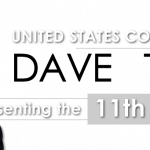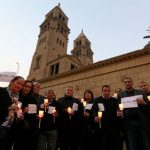By Samuel Tadros – Wall Street Journal –
Egypt’s minorities, long persecuted, are counting on the U.S. president to defend religious freedom.
Islamic State’s local affiliate in Sinai claimed credit for the bombing of St. Peter and St. Paul’s Church in Cairo earlier this month. The group could not have chosen a more symbolic target. Erected in 1911, St. Peter’s was an architectural marvel built and decorated by Italian architects and mosaic artists.
It stood for a cosmopolitan Egypt that welcomed thousands of foreigners as its rulers sought to make it the Paris of the East. It captured the dreams and pains of the Boutros-Ghali family, which rose to power and financed the church’s construction after being emancipated from the shackles of dhimmitude. It represents what is now a bygone era.
Twenty-five worshipers, mostly women, died in the St. Peter’s blast. It is part of an ominous trend. Twenty Copts were killed by their neighbors during the 2000 New Year massacre in El Kosheh village. The Dec. 31, 2010, bombing of a church in Alexandria left 23 dead. The 2013 burning of more than 50 churches by Muslim Brotherhood demonstrators was the worst violence on Coptic churches since the 14th century. And the February 2015 beheading of 20 Coptic workers by Islamic State on the shores of Libya was the most horrifying incident for Copts in memory.
Persecution has never been alien to the Copts. Roman and Byzantine emperors, along with Arab and Turkish caliphs and rulers, have each claimed their share of Coptic blood. A church that stood as one of the pillars of Christianity in late antiquity was reduced to a small minority struggling for survival. Even during Egypt’s proto-liberal age (1923-1952), the Copts weren’t spared incitement and attacks.
Egypt’s generals were no better, but one thing had changed—the possibility of emigration. The slow flow of Coptic emigrants from Egypt in the 1950s has turned into a tsunami. Based on my research, I estimate that more than a million Copts have found new permanent homes in the West, where their more than 500 churches now flourish.
The Egyptian revolution of 2011 accelerated the process. The security vacuum, the empowering of Islamists in villages, and the Muslim Brotherhood’s rise to the presidency pointed to the coming doom. At their moment of desperation, many Copts placed their hopes, like those of other non-Islamist Egyptians, in army general Abdel Fattah Al Sisi. Those hopes were misplaced.
President Sisi may be personally sympathetic to the Copts, but his government has done little to protect them. Deadly bombings capture the world’s attention for a moment, but daily life for Copts in Egypt is a struggle. Discrimination is rampant—from government appointments to soccer teams.
Mob attacks on churches and homes occur frequently and are increasing, and security forces fail to prevent them. Anti-Copt attackers escape punishment as the government forces Copts into reconciliation sessions that sidestep the legal process and often reward the mob by acquiescence to their demands. A new law for building churches that every Egyptian ruler since Hosni Mubarak has promised was passed by parliament this year, but the law retains the role of state security in the approval process and ties approval of churches to the size of the community in the area.
President-elect Donald Trump has enjoyed phenomenal support among Copts and other Middle East minorities after eight years of Obama-administration neglect. The president-elect may be uniquely positioned to deliver in Egypt. Mr. Trump praised President Sisi on the campaign trail. The Egyptian leader is one of two heads of state that Mr. Trump met during the presidential election, and he was the first to congratulate the president-elect. Egypt faces enormous security and economic challenges and is desperate for U.S. assistance. Persecution of Copts should be among the top issues on Mr. Trump’s Egypt agenda.
If President Sisi is serious about viewing all Egyptians equally regardless of their religion, concrete steps must be taken. Police need to protect Copts from mob attacks and bring their attackers to justice. The practice of reconciliation sessions that has created a culture of impunity must end. The law for building churches should be revised to give Copts true freedom to build churches. A serious antidiscrimination law needs to be passed. President Sisi needs to offer his Coptic citizens more than a mere visit to their cathedral on Christmas Eve.
The wave of Coptic emigration is a testament to their plight in their ancient homeland, but it is also Egypt’s loss. Jews, Greeks, Italians and Levantines contributed to Egypt’s modernization, but President Gamal Abdel Nasser forced their emigration.
If the Copts continue leaving, Egypt will be a much bleaker country. As the Coptic-American intellectual Maged Atiya put it, “Egypt needs the Copts more than they need it.”
Mr. Tadros is a senior fellow at the Hudson Institute’s Center for Religious Freedom and a distinguished visiting fellow in Middle Eastern Studies at Stanford’s Hoover Institution.
_____________
http://www.wsj.com/articles/trumps-opportunity-saving-coptic-christians-1482363152?mod=djemMER
Photo: Egyptian security officials and investigators inspect the scene following a bombing inside Cairo’s Coptic cathedral, Dec. 11. PHOTO: REUTERS





